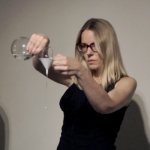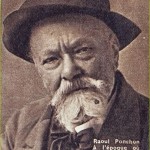A poem by Hugo Ball in a false translation by Melissa Grey & David Morneau
 When we were invited to participate in a concert celebrating the 100th anniversary of Dada, produced by Hans Tammen, we knew quickly that we wanted to incorporate an Oulipian technique in our composition process. Oulipo (short for Ouvroir de Littérature Potentielle) was founded in 1960 by the French author Raymond Queneau with a group of authors interested in exploring the potential of literature by applying constraints to the creative process, often rooted in mathematics. We are both attracted to the tight conceptual constraints of their techniques, and are deeply interested in translating their ideas to the process of music composition. This shared interest has fueled many conversations and has indelibly shaped our budding collaboration.
When we were invited to participate in a concert celebrating the 100th anniversary of Dada, produced by Hans Tammen, we knew quickly that we wanted to incorporate an Oulipian technique in our composition process. Oulipo (short for Ouvroir de Littérature Potentielle) was founded in 1960 by the French author Raymond Queneau with a group of authors interested in exploring the potential of literature by applying constraints to the creative process, often rooted in mathematics. We are both attracted to the tight conceptual constraints of their techniques, and are deeply interested in translating their ideas to the process of music composition. This shared interest has fueled many conversations and has indelibly shaped our budding collaboration.
Gadget Berry Dimple uses the Oulipian technique of homophonic (or false) translation. The idea is to translate words from one language to another based on sound rather than meaning. For example:
Le vierge, le vivace et le bel aujourd’hui
becomes
“Levy urge, levy vassal, hale bell!” assured we.

We began the process by taking Hugo Ball’s Gadji beri bimba (1916) and breaking it out into an alphabetical list of every word within. Then we created false translations for each word in the list, so that affalo became “a fellow”, brussala became “bruised salad”, katalominai became “cat and lonely mice”, and so on. Once finished, we reassembled Ball’s poem using our translations. The result (which is published here) was immediately captivating. We are planning to explore it further, using it as the basis for more music by applying additional Oulipian transformations to it.
For our performance on the 100th anniversary of Dada concert, we created a live sonic texture using a Benjolin synthesizer, a vintage Merlin toy, and a drum machine. Over that we read through our list of translated words as a glossary of false translation: Melissa recited the Ball’s original words and David recited our translations. A video of this performance can be seen here: http://artisteordinaire.org/gadget-berry-dimple-a-glossary-of-false-translation/
– Melissa Grey & David Morneau (2016)
Sources: Oulipo Compendium (Harry Mathews & Alastair Brotchie), l’Artiste ordinaire (artisteordinaire.org)
Photo credits: Marc Fiaux
Gadji beri bimba
by Hugo Ballgadji beri bimba glandridi laula lonni cadori
gadjama gramma berida bimbala glandri galassassa laulitalomini
gadji beri bin blassa glassala laula lonni cadorsu sassala bim
gadjama tuffm i zimzalla binban gligla wowolimai bin beri ban
o katalominai rhinozerossola hopsamen laulitalomini hoooo
gadjama rhinozerossola hopsamen
bluku terullala blaulala loooo
zimzim urullala zimzim urullala zimzim zanzibar zimzalla zam
elifantolim brussala bulomen brussala bulomen tromtata
velo da bang band affalo purzamai affalo purzamai lengado tor
gadjama bimbalo glandridi glassala zingtata pimpalo ögrögöööö
viola laxato viola zimbrabim viola uli paluji malooo
tuffm im zimbrabim negramai bumbalo negramai bumbalo tuffm i zim
gadjama bimbala oo beri gadjama gaga di gadjama affalo pinx
gaga di bumbalo bumbalo gadjamen
gaga di bling blong
gaga blung
Gadget Berry Dimple
by Hugo BallGadget berry dimple; grand treaty. Louder, lonely tandoori.
Pajama gamma, buried home, timbales, grand tree. Melis-iss-sa: “Lolita longs for me.”
Gadget berry (gin blossom glossary). Louder, lonely cats or you, sad salad? Bim:
“Pajama toughen!” I, some olive, been banned. Glee club? Wow! only me (gin berry) banned.
O cat and lonely mice. [rhinoceros solo] Hans Tammen: “Lolita longs for me.” Who?
Pajama Rhinoceros. [solo: Hans Tammen]
Blue queue tarantula; blue lager low.
Chin, chin, you rule a lot. Chin, chin, you rule a lot. Chin, chin, sandwich bar. (Some olive sham!)
Elephant totem, bruised salad. Pillow men: “Bruised salad.” Pillow men: “drum louder.”
Hell, no! Ha! Pang bland. A fellow purse of mine, a fellow purse of mine. [legato: tire]
Pajama bee’s halo. Grand treaty glossary. Zinc starter, pimp! Alone ogre grow.
Voilà: lacks a toe. Voilà: sing this hymn. Voilà: Oulipo Fallujah Morneau.
Toughen, ein sing this hymn? No, not mine. Bungalow? No, not mine. Bungalow toughen—I shim.
Pajama timbales. Oh, berry pajama. “Dada the pajama,” a fellow pins.
“Dada the bungalow, bungalow,” god of men.
Dada the bring blonde?
Dada brung!
translated from German by Melissa Grey, David Morneau, & l’Artiste ordinaire


